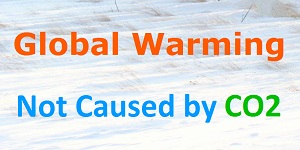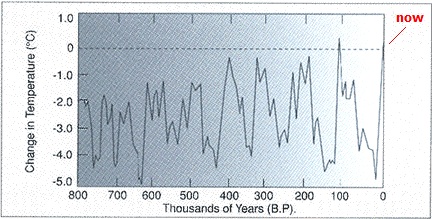| ||||||||||||||||||||||||||||
|
Gary Novak
Why Global Warming Science is Nothing but Fraud Saturation, Proof of Climate Science Fraud Fudge Factor for Settled Science Fakery of the Primary CO2 Effect
Crunching the Numbers Absorption Spectra Explanations Simple Words Contrivance Communication Corruption
The Cause of Ice Ages and Present Climate |
Scientific Fraud at the Origins of Modern Global Warming Science
At the origins of modern global warming science was a request in by the Office of Science and Technology Policy to create a study group for answering questions about global warming. The result was a publication by Charney et al, 19791, determining the expected temperature increase upon doubling the amount of carbon dioxide in the air. The group used modeling for the determination. The results were not described in an honest manner, and the procedure was totally incapable of producing the claimed result. Mockeries were supposedly modeled, such as "horizontally diffusive heat exchange." There is no such thing. Snow cover and light reflected from it were supposedly modeled for the next century, while weathermen cannot predict snow cover two weeks in advance (As Atlanta showed). No Starting Point for Heat Produced by Carbon Dioxide Modeling requires a concept of how much heat carbon dioxide should produce. A number for heat must be fed into the model, or there is nothing to model. But that quantity was the end result of the modeling by Charney et al rather than the starting point. What can be modeled without the influence of carbon dioxide? A Mechanism Could not be Described This occurred because there is no concept in climatology for a mechanism that produces heat from carbon dioxide. Early on, a mechanism near ground level was assumed, but it didn't stand up to evaluation, so the concept shifted to high in the atmosphere, which is even more absurd. There is no way to get heat radiated back to the surface from high up. Half of the radiation would go upward rather than downward; What Really Happens Global warming does not exist and is not scientifically credible. The amount of carbon dioxide in the atmosphere is so low that all biology is on the verge of becoming extinct due to a shortage of CO2 which is needed for photosynthesis. There was twenty times as much CO2 in the atmosphere when modern photosynthesis evolved. Oceans continuously absorb CO2 and convert it into calcium carbonate and limestone. The calcium never runs out, and the pH of the oceans never drops below 8.1 for this reason. It's the pH which calcium carbonate buffers at. If not, why hasn't four billion years been long enough to get there? The planet is cooled by radiation which goes around greenhouse gases, not through them. Cooling results in an equilibrium temperature which is independent of how heat gets into the atmosphere. It means greenhouse gases have no influence upon the temperature of the planet. The Erroneous Assumption The primary error is the assumption that global temperature is determined by how the planet is heated rather than cooled. Not so. The heat is everything that the sun adds to the earth. How the heat is moved around is irrelevant. A jar of pickles will absorb radiation, but it doesn't heat the planet. If the rate of heat leaving were the "delicate balance" which is claimed, nothing about it would be stable. To think life lucked out at 180 or 280 parts per million CO2 is stupidity. The temperature changes by at least 5°C between each ice age, which occurs every 100 thousand years. All major forces in nature equilibrate. They change until they can't change anymore, which is equilibrium. Science Requires Measurements and Standards Science isn't just anything that complex studies can do. It must achieve an expected result of reliability in determining basic reality. The reliability is totally dependent upon the procedures and standards. Why are we told the science is settled, when there was no reliability in the methods used? Reliability is not in the virtues and infallibility of scientists. Charlatans could provide plenty of that. Science is a more credible way of creating reliability. Only measurement of evidence in reproducible form will produce the reliability that science is expected to have. Achieving this result in the complexities of supposed global warming is so far removed from existing science that no attempt has been made along such lines, while modeling is used as a substitute. Climate Science cannot achieve the Claimed Results Real science cannot be produced for climatology beyond miniscule effects. Science is unreachable for climatology due to the infinite complexity and randomness. Weathermen cannot predict more than a few days with the most rudimentary concepts of temperature and precipitation for the same reasons. Climate is weather extended farther into the future. Climatologists cannot reach into the distant future any more than weathermen can. Yet modelers pretend to have every detail which influences temperature evaluated for the next hundred years. This includes such effects as the amount of snow cover and light reflected from it. They didn't know how much snow there would be this winter (2013-14) more than a few days in advance. How then can they predict the same thing for the next century? Their claims are nothing but fakery. The pretense/assumption is that long-term averaging is totally subject to analysis. Wrong. Long-term effects include as much complexity and randomness as short-term effects, as shown by historical graphs which include endless up and down spikes. The fake hockey stick graph showed a straight-line history, which did not include a "Medieval Warm Period" and "Little ice Age." Rationalizers said those effects occurred only in the Northern Hemisphere. To get an unchanging average, the opposite would have had to occur in the Southern Hemisphere. Implicit is something holding the average constant, while nothing but CO2 induces average change. Long-term graphs show there are no straight lines. Are repeated ice ages every 100 thousand years an unchanging average?
Modelers Start at the End Point Modelers of global warming start at the end point with a desired result of 3°C temperature increase upon doubling the amount of carbon dioxide in the atmosphere. They then pretend to have a scientific method of arriving at that result. But complexities are so far removed from their analysis that they cannot produce a consistent explanation of how they derive the result. The publication of Charney et al, 1979, vaguely describes various elements of atmospheric effects which were evaluated with no explanation of actual methodology. Without a methodology being described, no scientific criticism of procedures is possible. All real science requires at least enough methodology being describe to allow other scientists to evaluate the results. In climatology, such standards do not exist in foundation publications. For example, Charney et al listed endless atmospheric effects which they modeled, while most of the effects are nonexistent and incoherent, such as "horizontally diffusive heat exchange," which doesn't exist in the atmosphere. Heat balance was supposedly entered into the model, while heat balance does not exist in the atmosphere, because heat is transformed into other forms of energy such as radiation in varied ways, while total energy equilibrates through radiation. Historical Temperature was Used by Hansen et al Later modeling by Hansen et al (1984, 1988)2,3 attempted to start with a concept of how much heat carbon dioxide should produce, while the modeling was then used to evaluate secondary effects, mostly water vapor which would supposedly increase and add twice as much heat as the primary effect by carbon dioxide. Hansen et al stated that "empirical observation" was used to determine the primary effect by carbon dioxide, by which they meant the assumed historical record. One problem is that the historical record would include secondary effects, which means they compounded the secondary effects. Another problem is that real scientists would never assume that historical temperature records are free from natural influences other than carbon dioxide. Yet Hansen et al arrived at approximately the same conclusion as Charney et al, that the expected temperature increase upon doubling the amount of CO2 in the atmosphere would be about 3°C. This result is always given for hundreds of such studies with widely varying procedures, which shows that it is nothing but a contrived end result with nothing but fakery for a method of deriving it. Watts per Square Meter in the Atmosphere Another problem with all such attempts to determine how much heat carbon dioxide should produce is that the results are given as watts per square meter. There is no surface in the atmosphere to evaluate in terms of square meters. The result should be stated in terms of cubic meters of mass. Not doing so shows a total lack of concern for scientific legitimacy. In other words, the studies were such a misrepresentation of science from beginning to end that fixing one highly visible problem was not assumed to be relevant. Radiative Transfer Equations were Used Eventually, Myhre et al, 19984, pretended to make a direct attempt to determine the primary effect of carbon dioxide. They claimed to use "radiative transfer equations." Those equations were not designed to show heat. They have the purpose of showing how radiation is depleted as concentration of a gas changes. An additional study might evaluate the heat resulting from the radiation, but it would be impossibly complex and was not mentioned. Worst of all, Myhre et al added modeling of atmospheric effects to their study. The obvious reason for including modeled atmospheric effects was to muddle the subject beyond accountability, since radiative transfer equations were vulnerable to criticism. Then they said their study showed earlier studies to only be off by 15%, but their study could not be compared to other studies, because earlier studies could not separate primary effects from secondary effects. Where is the Science? Wherever global warming is promoted, the pretense or claim is that an underlying science is beyond question. Where is that science? Why aren't we told what it consists of, if it is so unquestionable? It doesn't exist. It isn't that global warming has to be there, and scientists have to find a way to represent it. Global warming is not scientifically credible. Fudge Factor as Primary Effect The primary effect published by Myhre et al, 1998, takes the form of a three component equation. Such overly simplified equations in science are called fudge factors. They are never valid in science, because over-simplification cannot properly represent complexities. In engineering, such simplifications are desirable in expediting production. But in science, where knowledge is built upon previous knowledge, errors corrupt future knowledge and grow with it. Imperfection is not the problem, as improvements are continuous in science. The problem is that the errors of fudge factors get locked in place and applied in inappropriate ways. Strangely, critics (called deniers) including Roy Spencer and Richard Lindzen, use the fudge factor claiming it is a flawless representation of the primary effect, while they argue secondary effects only. Now days, the fudge factor replaces modeling for the primary effect, though modeling was used to derive the fudge factor. Modeling now days is only applied to secondary effects due to the assumption that the fudge factor is a flawless representation of the primary effect. The fudge factor isn't a crude representation of the primary effect; it is fraud on top of fraud, as there is no primary effect, and no mechanism can be explained for producing it. Throwing modeling into the determination of the primary effect shows that obfuscation was needed to cover up the frauds involved. 1. Charney, J. G., Arakawa, A., Baker, D., Bolin, B., Dickerso, R., Goody, R., Leith, C., Stommel, H.M. & Wunsch, C.I. 1979 Carbon Dioxide and Climate: A Scientific Assessment. Washington, DC. National Academy of Sciences Press. 2. Hansen, J., A. Cacis, D. Rind, G. Russell, P. Stone, I. Fung, R. Ruedy, and J. Lerner, 1984. CLIMATE SENSITIVITY: ANALYSIS OF FEEDBACK MECHANISMS. Geophys. Mono. 29:130-163. 3. Hansen, J., I. Fung, A. Llacis, D. Rind, S. Lebedeff, R. Ruedy, G. Russell, and P. Stone, 1988. Global Climate Changes as Forcast by Goddard Institute for Space Studies, Three Dimensional Model. J. Geophys. Res. 93:9341-9364. 4. Myhre, G., E.J. Highwood, K.P. Shine, and F. Stordal, 1998. New estimates of radiative forcing due to well mixed greenhouse gases. Geophys. Res. Lett. 25:2715-2718.
|
||||||||||||||||
 | |||||||||||||||||


 only 30% of the radiation, at most, would go around greenhouse gases to get to the surface; and about 70% of the radiation would be absorbed into the oceans, where heat accumulates for thousands of years between ice ages. All in all, at least
only 30% of the radiation, at most, would go around greenhouse gases to get to the surface; and about 70% of the radiation would be absorbed into the oceans, where heat accumulates for thousands of years between ice ages. All in all, at least 